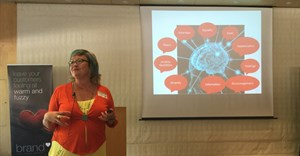Newspapers' size, colour and revenue streams will change
Deedes, who believes newspapers have a great future, despite the dramatic rise of readers of electronic media, Bizcommunity.com included. In fact Deedes all but ignored the threat posed by the internet and alternative media such as mobile phones and technology innovation - focusing instead on how newspapers should differentiate themselves from television and radio, through revenue and by design.
"In my view, the role of the newspaper has not diminished as the mountain of information circles the world. It actually becomes more important. The need for a third party to edit, disseminate and distribute this information in a readable format, becomes more necessary," Deedes emphasized.
"Key to publishing success, in my view," he explained, "is the need to understand change and embrace new options. How we print, market, distribute, interact with people who sell our newspapers, with the people who buy them, the price at which we sell them... if we stand still for a moment or take any of them for granted, we will be lost.
"The question then, is how do we evolve?" asked Deedes.
New revenue streams
The most important part of the newspaper publishing world is the editorial content, he emphasized. Without it, there is no newspaper. It is the journalism that decides the reader on his or her choice. It is also the area which, arguably, requires the most attention. We as newspapers are no longer the dominant media. We lost that to tickertape first, then radio and TV. I like to think about TV and radio as the 'teasers' to tomorrow's paper, rather than direct competitors.
"We must then fulfill better the parts that TV and radio take - that of broadcasting the headlines. Getting behind the news, is a strength we must particularly play to (on newspapers).
"Newspapers of the future also need to build a relationship with the purchaser that goes far beyond just reading it and disposing of it. Newspapers need to 'become the readers friend' I say to my fellow publishers."
In an industry which has fixed costs, developing a third revenue stream, will become increasingly important to publishers. "The more you know about each reader, the better you can communicate with them, better able to sell them goods and services."
Deedes said another revenue stream undergoing a sea of change was advertising. He said it was highly unlikely that the heady days of advertising revenues would ever be reached - job sites on the internet are here to stay, for example..."the important thing to ensure is that it is your website".
Size matters
Newspapers cannot compete with the reach of television from a media planners' perspective, and in the UK, the issue now is size of the paper. Whether broadsheet newspapers will remain in the future is a hot debate. In November The Times ceased publishing its broadsheet issue. All research indicates that younger and female readers prefer smaller, tabloid newspapers.
The most important piece in the jigsaw, in Deedes opinion, is newspaper design. Too little attention has been paid to design as the quality of printing, particularly colour printing and black and white pictures are now regarded as "quaint". The future of newspapers is in colour.
Deedes, surprisingly, did not touch on the influence of the internet on newspapers, dailies in particular, ignoring it completely.
In this Editor's opinion, the internet is the greatest threat to newspapers in developed economies, as many business people, myself included (even as an ex-newspaper journalist), receive 90% their daily business and general news online, not through print, as time famine hits the daily working environment with the proliferation of email, ezines and Net research that needs to be undertaken and read on a daily basis.

















